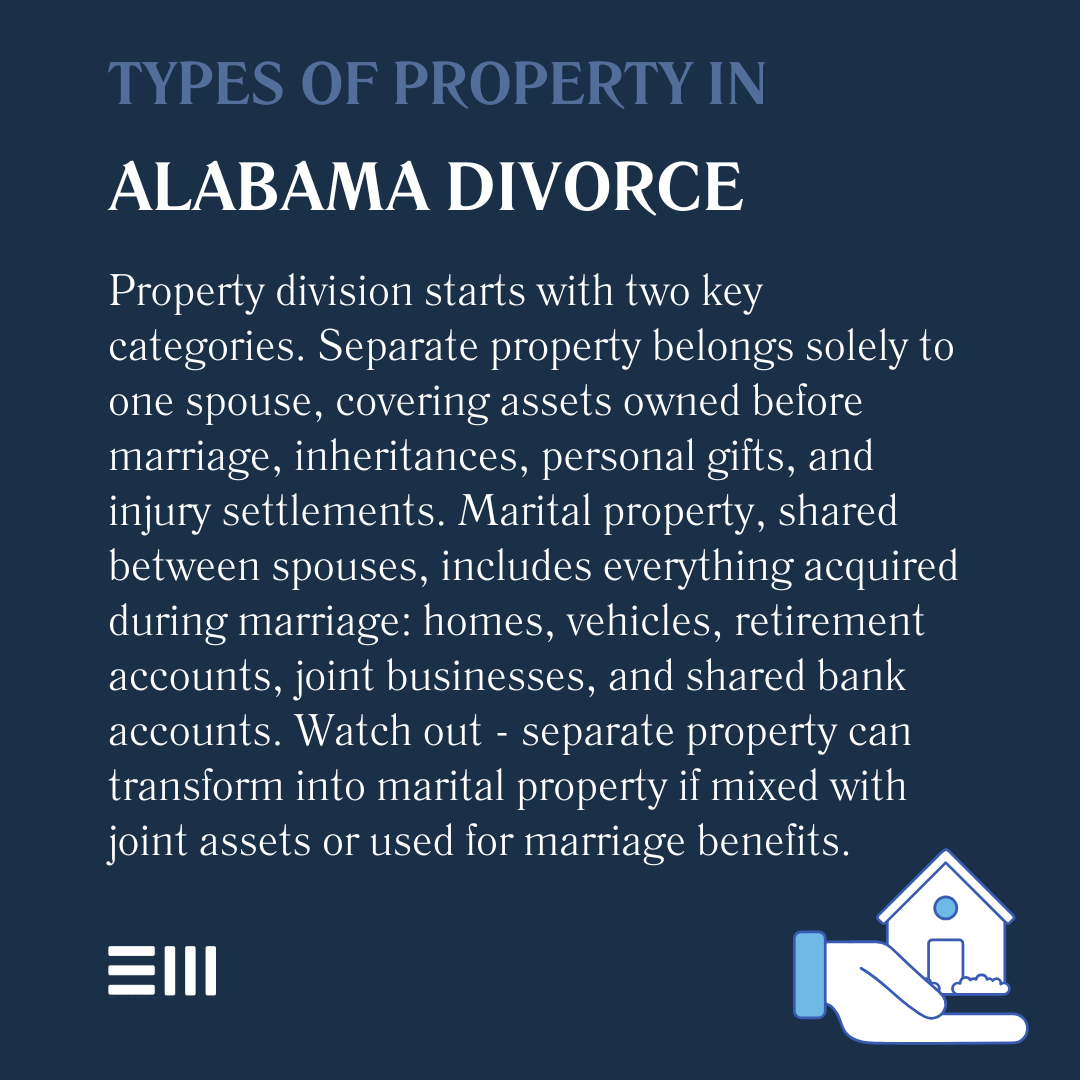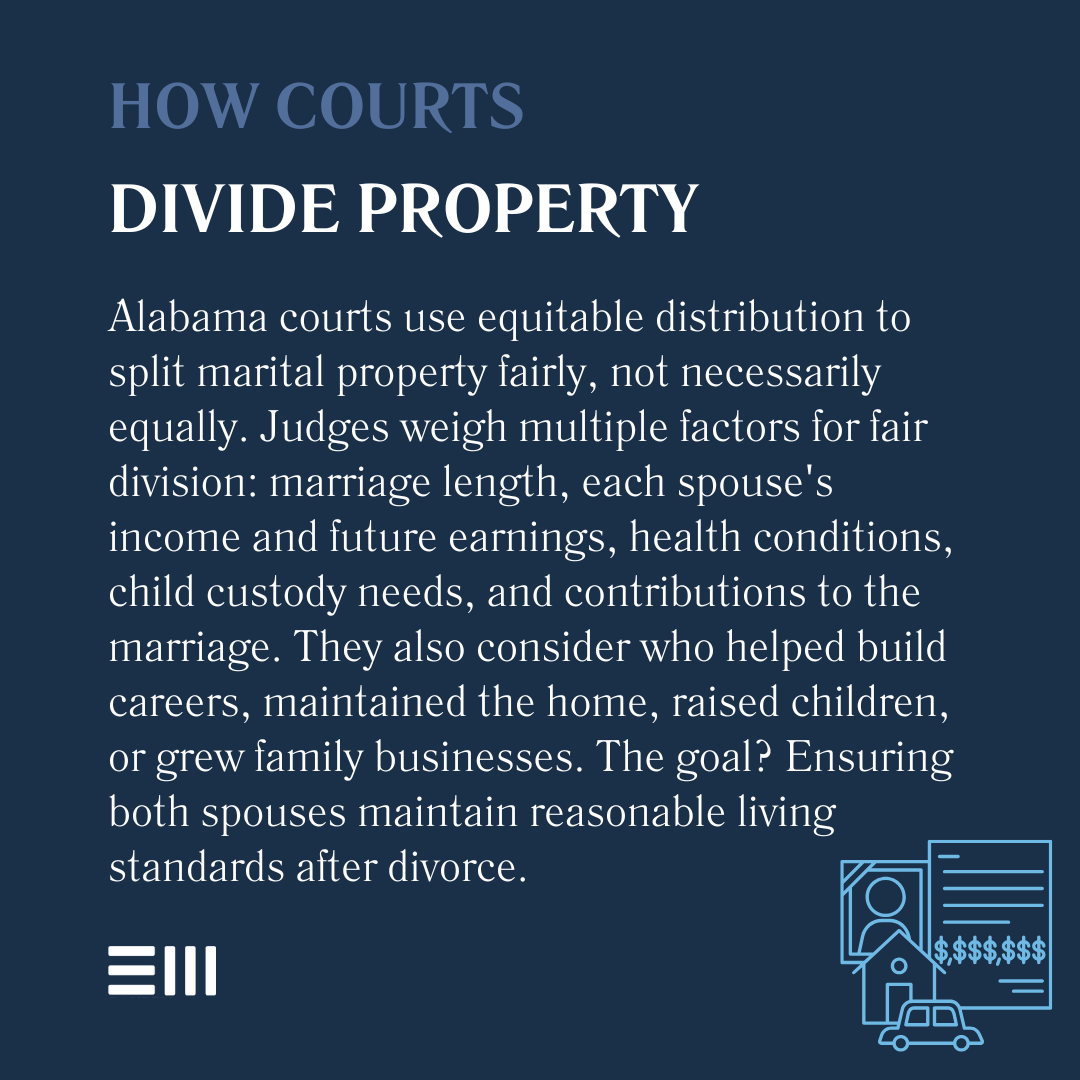The family home you spent years making memories in. The small business you built together from the ground up.
Retirement accounts meant to secure your golden years. During divorce, these aren't just assets on a spreadsheet—they represent pieces of your life's work and dreams for the future.
In Alabama, how these assets are divided can shape your financial stability for years to come, affecting everything from where you'll live to when you can retire.
Understanding Property Division in Alabama
Alabama follows the equitable distribution model for dividing marital property during divorce. This means the court aims to divide property fairly, though not necessarily equally.
Each spouse's economic and non-economic contributions to the marriage are carefully weighed to determine a fair distribution.
The court considers various factors when dividing property, including the length of the marriage, each spouse's age and health, and their respective earning capacities.
This approach ensures that both parties have the resources needed to move forward after divorce.
Types of Property in Alabama Divorce
In Alabama, property in divorce falls into two main categories:
Separate Property:
- Assets owned before marriage;
- Inheritances received during marriage;
- Gifts given specifically to one spouse;
- Personal injury settlements; and
- Property designated as separate in a prenuptial agreement.
Marital Property:
- Income earned during marriage;
- Houses, vehicles, and furniture purchased during marriage;
- Retirement accounts and pensions accumulated during marriage;
- Business interests developed during marriage;
- Investment accounts and stocks acquired together; and
- Joint bank accounts and savings.
Understanding these distinctions is vital because separate property typically remains with its original owner, while marital property is subject to division.
However, separate property can become marital property if it's mixed with joint assets or used for the marriage's benefit.
Factors Courts Consider When Dividing Property
Alabama courts evaluate numerous factors to ensure fair property division:
Economic Factors:
- Each spouse's current income;
- Future earning potential;
- Job skills and education level;
- Business ownership and valuations;
- Retirement benefits and pension plans; and
- Tax implications of property division.
Personal Factors:
- Marriage duration;
- Age and health of each spouse;
- Child custody arrangements;
- Contributions to the marriage;
- Standard of living during marriage; and
- Each spouse's separate assets.
The court also considers whether either spouse:
- Contributed to the education or career advancement of the other;
- Maintained the household and cared for children;
- Helped build or grow a family business; and
- Committed marital misconduct affecting finances.
These factors help judges determine the most equitable way to divide property, ensuring both parties can maintain reasonable living standards after divorce.
Common Challenges in Property Division
Several complex situations often arise during property division in Alabama:
Business Valuation:
- Determining fair market value;
- Accounting for goodwill;
- Assessing future growth potential;
- Considering debt obligations; and
- Evaluating partnership agreements.
Hidden Assets:
- Undisclosed bank accounts;
- Cryptocurrency investments;
- Transferred property to third parties;
- Underreported business income; and
- Delayed bonuses or commissions.
Complex Assets:
- Stock options and restricted stock units;
- Intellectual property rights;
- Multiple real estate properties;
- International assets; and
- Trust beneficiary interests.
Professional assistance from forensic accountants, business valuators, and experienced attorneys often becomes necessary to address these challenges effectively.
Courts take attempts to hide assets seriously and may penalize the offending spouse in the final property division.
Frequently Asked Questions About Property Division in Alabama
Property division often raises many questions during divorce proceedings.
Here are answers to common concerns Alabama residents face when navigating this process.
How Is the Marital Home Handled in Divorce?
The marital home often represents the largest asset in divorce. Courts typically consider factors like child custody, mortgage obligations, and each spouse's financial ability to maintain the property.
Common solutions include selling the home and dividing proceeds, one spouse buying out the other's interest, or allowing one spouse to remain until children reach adulthood.
What Happens to Retirement Accounts?
Retirement benefits acquired during marriage are considered marital property. These accounts require special handling through Qualified Domestic Relations Orders (QDROs) to ensure proper division without triggering early withdrawal penalties.
Can I Keep My Inheritance?
Inheritances received during marriage typically remain separate property if kept distinct from marital assets. However, mixing inherited funds with joint accounts or using them for marital purposes may convert them to marital property.
How Are Debts Divided?
Courts divide marital debts similarly to assets, considering who incurred the debt and its purpose. Joint debts are typically shared, while personal debts may remain with the spouse who incurred them.
What if My Spouse Hid Assets?
Courts can impose penalties on spouses who hide assets, including awarding a larger share of marital property to the other spouse. Legal remedies exist to discover and recover hidden assets.
Protecting Your Property Rights
Take these important steps to protect your interests during property division:
Document Everything:
- Create inventory of assets and debts;
- Gather financial statements and records;
- Save tax returns and pay stubs;
- Photograph valuable items; and
- Keep communication records.
Maintain Separate Property:
- Keep inheritance funds separate;
- Document gift sources;
- Maintain clear property titles;
- Track business interests; and
- Record property improvements.
Avoid Common Mistakes:
- Don't hide or transfer assets;
- Maintain accurate financial records;
- Keep copies of important documents;
- Avoid emotional decision-making; and
- Seek professional guidance early.
Taking these proactive steps early in the divorce process can significantly strengthen your position during property division negotiations and help ensure you receive a fair settlement that protects your financial future.
While not illegal, dating during divorce proceedings may complicate matters and affect custody or property division decisions.
Take the Next Step in Protecting Your Property Rights
Don't navigate Alabama's complex property division laws alone. Our experienced divorce attorneys understand what's at stake and can help protect your financial future.
We'll work tirelessly to ensure you receive a fair share of marital assets while protecting your separate property rights.
Contact us today for a confidential consultation. Let us help you secure the property settlement you deserve and start building your new future with confidence.


